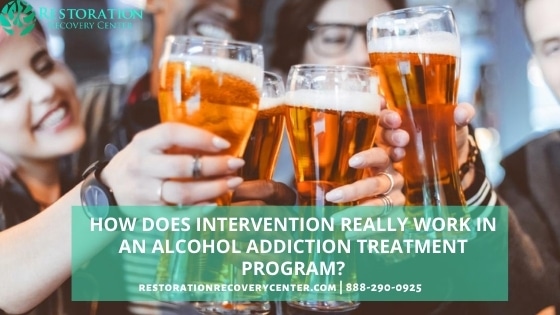How Does intervention really work in an Alcohol addiction Treatment Program?
Intervention in an alcohol addiction treatment program is a structured conversation between a patient and their close family and friends, often under the supervision of an intervention specialist.
Usually, if the patient has tried talking to one person without any visible change, the next step is going for an intervention. It is in these interventions that the patients are shown how their actions are affecting their loved ones.

alcohol addiction treatment program
The main goal here is to convince the patient to get into rehabilitation and recovery. Approaching a person struggling with addiction is not that easy. Their friends and family might not know the right words to use when trying to talk to their patient. The addiction patient can also deny having any problem with substance abuse, addiction, or relapse, which makes it all the more difficult for their close loved one to talk to them.
In this post, we are going to learn and discover how intervention in an alcohol addiction treatment program helps those you care about.
How does intervention work?
An intervention session provides particular examples of destructive behaviors and their negative impact on the ones you love. It also outlines prearranged treatment plans with clear guidelines, steps, and achievement goals.
It states the possible course of action to be taken in case the patient refuses to accept the treatment, even after the intervention. The loved ones in the intervention groups gather information about the extent of their patient’s addiction problem and access all the available treatment methods. This way, they can speak to the patient informatively and encourage them to proceed with the treatment program.
The role of an addiction specialist in intervention circle
Including the services of an addiction specialist such as a social worker or a counselor will help your loved one look forward to their alcohol addiction treatment program. The specialist takes the patient’s condition into account and depending on the severity of their addiction, advises the best approach to take as a treatment method.
They will also advise the intervention circle on how to start the sessions and the areas that critically need to be addressed.

alcohol addiction treatment program
Most intervention sessions take place without the presence of an intervention specialist, but having a skilled professional present is more likely to be effective. Having an intervention specialist will also help the circle to convey their concerns more freely, of course, with the regulation of the specialist.
This way, both their message and their feelings towards the patient are effectively communicated through.
Members of the intervention group
The intervention group usually consists of at least six members from a list of close family and friends. This includes people loved and respected by the patient. This can be anybody from best friends, elderly relatives, or a member of their faith.
A patient has the right to consult with their intervention counselor to find out the most appropriate people to include in the intervention group.
This is important mainly because they need to have people that they can listen to seriously and give serious thought into their suggestions. They also need to have people whom they are most comfortable around.
Identifying the treatment program which will be combined with the intervention program
There has to be an alcohol addiction treatment program in place that will be used alongside or immediately after the intervention session, which is if the intervention will be a success. However, how do you find the perfect treatment program?
The scope and intensity of treatment programs may vary, which is why there is a need to do thorough research to identify the most suitable plan to follow after the intervention. Members of the intervention circle can help with the investigation.
A successful intervention session
A patient has to realize that their addiction and abuse behavior triggers strong emotions in their loved ones. To ensure that the intervention session is successful, the patient has to carefully listen to the concerns of their loved ones, and be willing to make an effort to follow through with the treatment program.
Having calm and rational responses for every concern raised at the substance abuse intervention session is the best way to determine if the patient is ready for treatment. This is one of the most effective methods of ensuring the success of the intervention session at Auburn Addiction Treatment Center.
If you still do not know about how to prepare for the intervention, you can always consult the addiction specialists at the Restoration Recovery center. It is one of the substance abuse treatment centers with all the resources needed for effective intervention in California.






